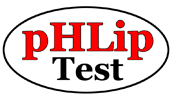What's a pHLip Test?
To ensure the highest quality of fuel for your engines, the pHLip Test acts as a firewall against ‘bad’ fuel. There can be two major quality issues with biodiesel:
- Poor quality traced to the manufacturer. When oils and fats are converted into biodiesel, 100% conversion is impossible and some dissolved contaminants such as oxidized esters, excess catalyst, soaps or glycerines may remain. While most manufacturers are diligent to clean and test their fuel to ASTM specifications, we have found that some lots do not get properly cleaned or tested before being shipped out. In these cases, using the pHLip Test can help you find poorer quality fuel, making it an essential tool for fuel distributors.
- Poor quality due to handling and storage issues. When biodiesel is shipped in various rail cars and tankers and stored for differing lengths of time in wildly changing climates, biodiesel that met specification at the manufacturer may go out of specification before its final use. Aged fuel, exposure to gasoline, rust or other incompatible materials or exposure to excess heat or cold can result in oxidized fuel or other harmful contaminants. Any of these problems can cause excessive filter clogging and even damage to the engine. In these cases, using the pHLip Test can help you find poorer quality fuel, making it an essential tool for fleets, retail and end-users.
ASTM D-6751 testing requires a Gas Chromatograph (GC) to be accurate. Owning and operating a GC in every gas station or at every storage tank is not feasible, and the time needed for outside testing is impractical. Bad fuel should then be sent to a lab for real quantitative testing.
The pHLip test includes a proprietary recipe that can be calibrated against a Gas Chromatograph (GC) to provide consistent test results. For more specific instructions on using the pHLip Test, see Instructions.
FOG pHLip Test for screening fats, oil & grease feedstock
The FOG pHLip Test is a real time (10 minute) visual check of feedstock quality to allow ‘good to moderate’ levels of Free Fatty Acids (FFA) to be sorted in the field from ‘Bad’ (High FFA) oils that would be unsuitable to make into ASTM Biodiesel. Please contact us at phliptest@gmail.com or 510-233-0102 for more information.
